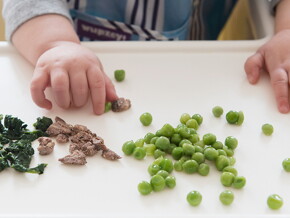
How to Handle a Picky Toddler
Your child is a master at eating solid food already, but is he the kind who is refusing to eat anything but fried chicken every time?
If your child’s nutrition is a sore topic in your household, hindi ka nag-iisa! Contrary to popular belief, kids are not born to like hotdogs and skip vegetables. Rather, children’s picky eating habits are made. And the usual suspects are the parents themselves, according to Nutritionist Mary Jude Icasiano.
Take this quiz to test your knowledge about handling your “Picky Eater Toddler”.
TRUTH OR MYTH QUIZ
1. Children should finish everything on their plate. Truth or Myth?
Myth. Better to provide small servings during meals and teach your little one to be aware of her hunger signals or fullness cues.
2. Promising dessert is a good way to encourage a child to eat. Truth or Myth?
Myth. This promotes overeating. A high in sugar, high in fat treat may lead to lifelong pattern of unhealthy eating.
3. Picky eaters won’t try any new foods. Truth or Myth?
Myth. Most children will try a new food after it is offered 1 - 8 times. Introduce new food in small quantities and continue to offer it even after it gets rejected. Here’s the good news - nearly all children outgrow the picky eating phase, one food at a time.
4. Kids should eat three big meals - breakfast, lunch, dinner – everyday. Truth or Myth?
Myth. Children function better on small portions throughout the day. Fix your child’s feeding schedule so that she has three regular meals and two healthy snacks in a day. Make sure your child has set mealtimes and snack times to help ensure that she eats when she is hungry and to lessen the chance of too much snacking.
5. Force your child to eat. Truth or Myth?
Myth. Let your kid eat what she wants if it’s healthy. Limit snacking to make sure that your child is hungry at mealtime. Set a good example by choosing healthy food and drinks.
Tips for introducing new foods to a picky eater
Your child has natural, intuitive sense of how much food her body needs to grow and be healthy. And it is she who makes the ultimate decision about what she’s going to eat. The best thing you can do, as a parent, is to provide plenty of healthy choices in a positive, relaxed environment so that mealtimes may be enjoyable for everyone. Here are some specific tips on how to handle a picky eater:
• Keep her tray simple by limiting the number of bowls, spoons, and cups. Too many things in sight may distract her attention and make her not interested in eating.
• Create a calm environment during mealtime by turning off the TV.
• Sit down at the table to eat as a family and include her in the conversation.
• A child’s appetite changes from meal to meal, and day to day. Don’t be overly concerned if she doesn't eat the amount you think she needs. Show her you respect her hunger and fullness cues.
• Avoid pressuring your child to eat. Your role is to decide what foods to offer and when to offer them. But let your child decide whether to eat and how much to eat.
• Include food she’s used to in each meal. Then, let her choose which other foods on her tray she would like to try.
• Give her time to chew, swallow, and even play a bit with new food. Playing with food is part of learning about it. Rushing her takes the fun out of eating and adds stress.
• Embrace the kalat! It will make the feeding experience more pleasant for you and your baby. Let him explore even if it gets messy—toddlers often need to look at, touch, smell, and taste food before eating it.
• Be patient. If your toddler refuses food, it might just be that she doesn’t recognize it.
• Don't give up on rejected food. Try preparing it a different way and then, offer it again.
• Serve a variety of healthy food, and set a good example by eating them yourself. If a child sees her mom, dad, or siblings eating nutritious food, she may be more willing to try it.
• Don’t bribe her with sweets. This teaches her that some foods are okay and others are not.
Co-written with Jennifer Navaja, RND.
References:
American Academy of Pediatrics. Bright Futures Nutrition, 3rd ed. Elk Grove Village, IL: American Academy of Pediatrics, 2011.
Maier A, Chabanet C, Schaal B, Issanchou S, Leathwood P. Effects of repeated exposure on acceptance on initially disliked vegetables in 7-month old infants. Food Quality and Preference. 2007;18:1023-32.
American Academy of Pediatrics. Your one-year-old. 6th ed. In : Shevlow SP, Altmann TR, ed. Caring for your baby and young child : birth to age 5. New York, NY : Bantam Books, 2014 : 295-336.
Related articles







